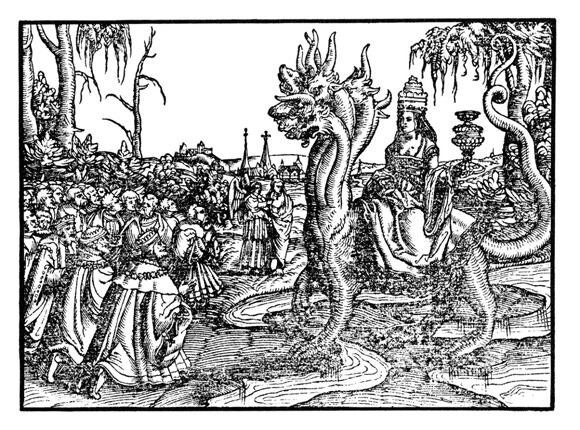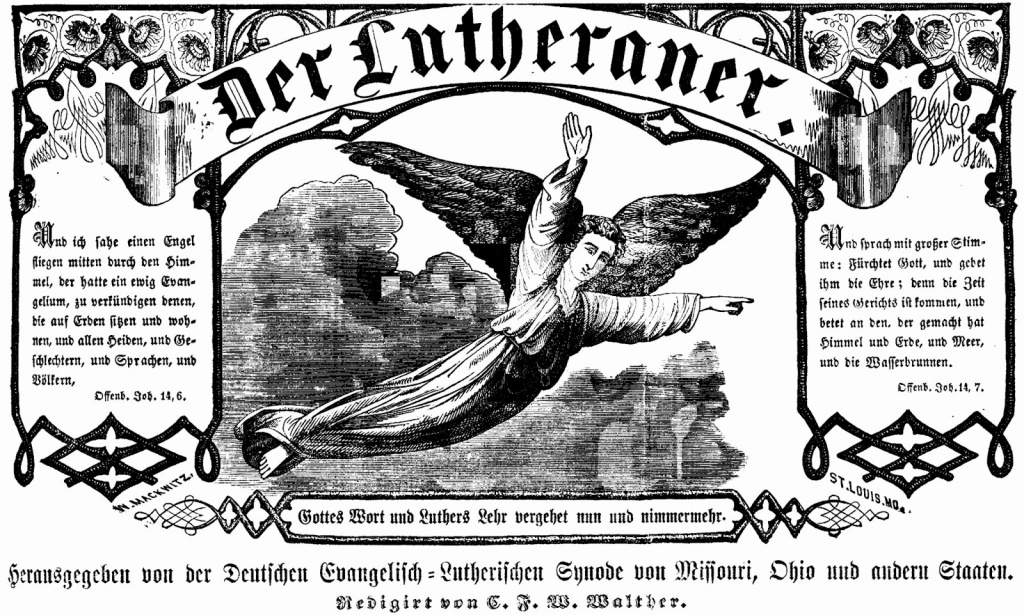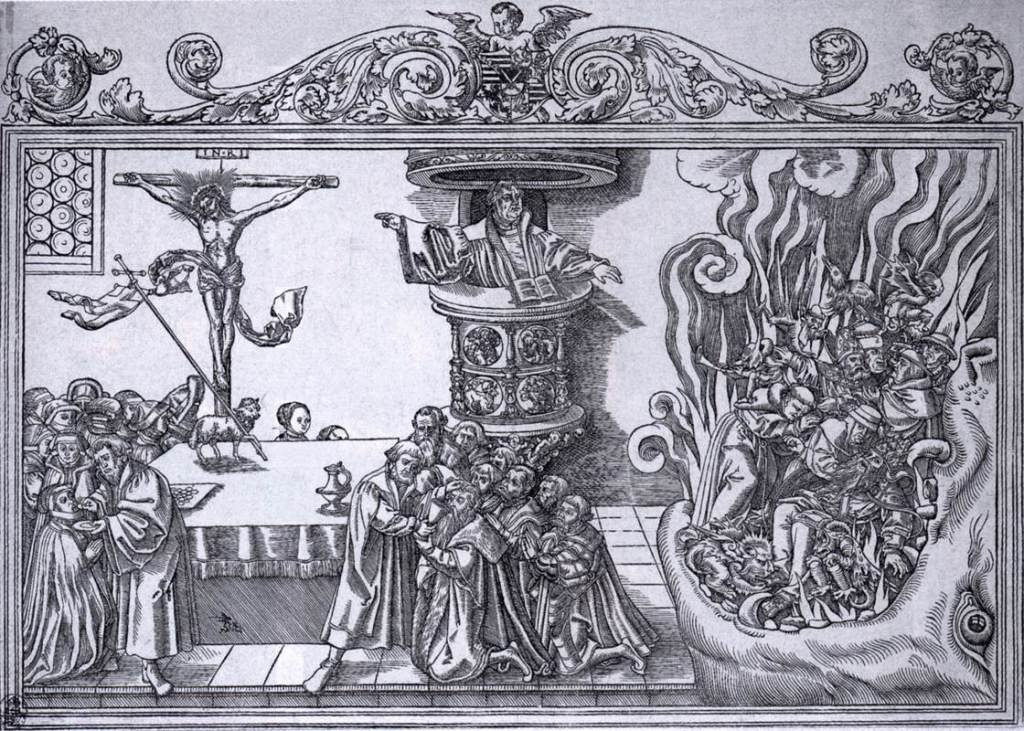The neo-Lutherans, especially those involved in the “liturgical renewal” of the previous century, have a tendency to be rather crass in their Romanizing. Among those still living, this is seen, e.g., in the Gottesdienst founder, “Father” Burnell Eckhardt, who is filled with outrage when it is made clear to him that his authority is derived from the authority of parents. He also, in accordance with his Romanizing principles, has condemned all opposition to papism. His remarks about how, when he was younger, Lutherans on vacation would attend Baptist and Reformed congregations to join in public worship, are worthy of their own (perhaps brief, but not if this post is any indication) article. However, for the purposes of this article, it suffices to say that this unionism — which Eckhardt wishes to spread so far as to include Rome, i.e., the abomination of the Mass, the worship of the dead, and servitude to the Antichrist — is but a sign of how deplorable things were in the LC—MS even then.
Eckhardt’s great commendation of apostate Richard John Neuhaus (d. 2009) is unsurprising, for he also promotes A. C. Piepkorn, who “gave [Neuhaus] an understanding of Lutheranism that required [his] becoming Catholic.” And this blasphemous understanding was that “the Church is not … formed by … formulas such as ‘justification by faith alone.’” Being a unionist at heart, Piepkorn naturally rejected the Scripture doctrine that the Evangelical Lutheran Church is the true visible Church of God on earth. Piepkorn, being “among the pioneers of Lutheran-Roman Catholic theological dialogue following the Second Vatican Council,” mourned the “tragic miscarriage” of Lutherans separating from Antichrist (Catholic Matters, pp. 55–56), and thus condemned every place in His Word where God forbids the mixing of Christ and Belial, where He condemns the false prophets and Christs; but especially did he condemn the saying of the apostle: “Avoid them.” It is therefore perfectly consistent that Piepkorn’s (and Eckhardt and his organization’s) attitude toward Reformation Day was one of “annual ambivalence” (Selected Writings, vol. 1, p. 89).
Now, it would be extremely dishonest if I were to pretend as though Eckhardt is alone in his organization’s Romanizing, for David Petersen, at the end of 2011, argued in a blog post that “Benedict [who, while pretending to give concessions to Scripture, insisted that “love,” i.e., good works, must be included in justification] is the friendliest pope in memory,” “Lutheran apologetics haven’t always been fair,” and that there is a need to “re-think and re-evaluate the Confessional identification of the office of the papacy with the antichrist.” (By using the term “office of the papacy,” our modern Lutherans claim that the office, to the exclusion of the actual pope, is identified as the Antichrist. That is to say, a pope may be a Christian. They even go so far as to argue, as Petersen did, that it may happen that the papacy can no longer be rightly identified as the Antichrist, for they “acknowledge the possibility that the historical form of the Antichrist could change” and “recognize the possibility, under God’s guidance, that contemporary discussions and statements … could lead to a revision of the Roman Catholic position regarding Tridentine dogma.” Cf. Franz Pieper’s Christian Dogmatics, vol. 3, pp. 467–469; here; and here.) We can therefore see plainly that the members of Gottesdienst are not, have never been, and will never be truly “confessional” Lutherans.
So that the reader may not think that I am overstating the case, I bring attention to a most crass post by Larry Beane titled “It is liturgy or it is nothing.” In this, Beane brings our attention to a quote from apostate Richard John Neuhaus (see above) in memory of Piepkorn:
All of our believing and all of our obeying, including all of our theology, is brought to the altar. It is liturgy or it is nothing.
In its “library,” Gottesdienst promotes the Romanizing Protestant Wilhelm Löhe, whom most “conservative” Lutherans today follow. In the same place, the Roman Catholic Liturgics is also promoted. In this same library, Friedrich Lochner’s The Chief Divine Service [DE], which contains Luther’s judgment on all external ceremonies (he specifically mentions vestments as an example), that they are “to be used freely, provided pomp and other excess be avoided,” was quite studiously given no mention.
A symptom of its Romanizing, Gottesdienst, in a blog post in which the lie that John 6 refers to the Sacrament of the Altar is presented as truth, shows its desire for congregations to believe similar, not to the analogy of faith, but to the naked declarations of the Roman popes. Scripture may then, if it agrees with the popes, be believed by the Christians.
Corey Mahler, in his article “Against the Guitar,” included the Gottesdienst slogan Leitourgia Divina adiaphora non est as an argument.
The formerly pseudonymous neo-Lutheran “Woe” has condemned the apostolic model of church government as “warped American polity” and “American-Waltherian polity” (for a refutation of the charge of “American polity,” see this post), and he thus concurs with Grabau in his condemnation of Missouri. Oddly enough, this is the same polity he elsewhere proclaims to be “the only remaining line of defense” as a justification for remaining in the LC—MS, whom he curses. However, this seeming inconsistency is shown to not exist, for in another place he describes this as the only possible upside of the apostolic model. In other places (e.g., here), Woe shows his truest thoughts on apostolic church government.
Now, one is inclined to wonder what the source of this Romanizing tendency among the neo-Lutherans could be. Fortunately, the worthless man at the root of this Gift has written extensively on his life’s work of destroying the holy Church of God from within. The godless Berthold von Schenk, taught by Franz Pieper himself (whom he repudiated), wrote Lively Stones, an autobiographical work that details “how [Missouri] evolved as a church body between the 1920s and the 1970s.” This work has been most unfortunately endorsed by Prof. David Scaer, without any information given regarding von Schenk’s wicked heresies promoted therein. I now present quotations from this work which show what kind of spirit must lead him, and “a good tree cannot bring forth evil fruit, neither can a corrupt tree bring forth good fruit.”
The Spirits Leading the “High Church” Lutherans, but They Are One Unholy Spirit
The spirit of pride:
Back in the twenties, I needed a new vestment. Up until that time every pastor wore Talar and Bäffchen (a black gown with white preaching bands at the neck). I just got the idea, “Why not purchase a cassock and surplice with stoles?” I did this on Ash Wednesday, and I recall distinctly that I appeared in all my glory something like Solomon. The restoration of ceremonial shocked the church, but I considered such things as ritual and ceremony simply to be God’s good table manners. Some welcomed the introduction of ceremonies, Gregorian music, and so forth, and most of my fellow-pastors thought that this was the emphasis. … It should have been obvious to me that liturgical theology could not really be accepted by a true Missourian, for if we had been successful in promoting the Liturgical Movement, it would have destroyed Waltherianism. It was a rude awakening for them when The Presence appeared. …
I think there was only one brilliant statement Professor Mezger, our homiletical professor at the seminary made, it was: “Nichts hält die Leute so gut zur Kirche als die gute Predigt.” …
Concerning moralism, no one can deny that the fathers of the Missouri Synod were strongly influenced by Pietism; Walther’s booklet Tanz and Theater (“Dance and Theater”) is an example. … I recall a fine young girl, full of life and vitality, a faithful church worker, Sunday school teacher, and so forth; she was always ready to serve and attended church services every Sunday, but she loved to dance. The pietistic Dr. Walther had forbidden dancing and theater, so the pastor, to be orthodox, had to do what this pope in sheep’s clothing [!] had commanded. This young lady came to register for the Holy Communion, and the pastor asked if she had given up dancing. With tears in her eyes she told him, “No, I have not.” He then refused her permission to make her Communion the following Sunday. …
It was a thrilling ministry after I found out that my business was to promote Leiturgia, Missio, and Diakonia in the various rundown parishes I inherited. I knew that I could not fail. …
The outline of the liturgy shows how amazing and complete the ignorance of Walther and his “yes men” was. …
Of course I introduced the surplice, stole, and cassock (and later the traditional Eucharistic vestments), but this was because I did not like to celebrate the Eucharist in an academic gown! To my great regret, the traditional Eucharistic vestments are still quite common in use.
The syncretistic spirit:
I did seek to gain a general, wider education. … For eleven years I took in three lectures a week at the Jewish Theological Seminary. …
On Sunday afternoons I heard a Roman Catholic monk in a Franciscan church in South St. Louis-he was one of the greatest preachers I have ever heard; through him I came to understand what it means to preach ad hominem. I also discovered the Reformed Jewish Synagogue in which Rabbi Harrison was the spiritual leader. … I have never heard anyone since who has been quite as eloquent. I still consider him one of the great preachers in my experience. …
My friend Friedrich Heiler sent Luther’s Christmas sermons to Evelyn Underhill [footnote on Evelyn Underhill: A synthesizer of prayer and mystical tradition, Underhill (1875-1941) was a respected spiritual director, author, translator, and poet named a Fellow of King’s College, London, in 1927. Her works Mysticism (1911) and Worship (1936) are classic treatments of the subjects, and her Eucharistic Prayers from the Ancient Liturgies (1939) played a significant role in sacramental and liturgical renewal.]; she wrote to him giving thanks and became a great admirer of Luther’s [that is, she had the same admiration for Luther as the rationalist Carlyle] after that. …
The great city of New York has Norman Vincent Peale and Bishop Sheen, but there is not one good preacher among the Lutherans in New York. …
The tragic split of the Ohio Synod and the Missouri Synod happened because of language. …
How much time and thought has been wasted by insisting on absolute truth in dogmas! Luther fell into that trap in his controversy with Zwingli and split the Reformation. I am referring to the dispute over two words das ist (“this is”) and das bedeutet (“this signifies”). Philosophically, the two expressions are the same. …
The Missouri Synod was the last hope, but what a pity that Walther separated himself from Loehe, one of the few true lights in Lutheranism who believed with Gerhard that the church which is not catholic is not the Church. …
The condition qua non of purity in our peculiar theology is far more dangerous than anything in Masonry. …
A group which insists on purity of doctrine, without an equal insistence on life and experience, and establishes an isolationist policy, separating itself from others, finds its precursor in the school of the Pharisees at the time of Christ. …
I lectured at a number of Roman Catholic universities in the United States, but never at any Lutheran college or seminary -that’s what lies and gossip can do to a man! …
I soon realized that our church was neither Christian nor Apostolic, and certainly not catholic. …
Luther, of course, was not a liturgiologist, nor a sacramentalist. The most stupid thing which Luther let himself in for was the Colloquy in Marburg with Ulrich Zwingli. How much time and thought has been wasted by insisting on absolute truth in dogmas! Luther fell into that trap in his controversy with Zwingli and split the Reformation. Zwingli had a much deeper understanding of the liturgy than we give him credit for, and his liturgy is far superior to that of Luther. The argument of dies bedeutet and dies ist (“this represents and this is”) was sheer nonsense. In scientific language bedeutet and ist are the same thing. Luther was fighting windmills, and his position, “Ihr habt einem anderen Geist als wir,” [You have a different spirit than us] was a tragic statement. …
There should be at least one cardinal point upon which agreement is readily apparent: the Reformation was unfortunate, unnecessary, and had negative results for both sides.
The sectarian spirit:
The Kingdom Plan brought about a great revival. We conducted some five meetings very much in the revival manner. The meetings I conducted emphasized the introduction of Holy Communion at every official service of the congregation. …
Thankfully [?] I had a parish in which I preached only in English. I learned to know some outstanding British preachers, especially Alexander McLaren [English Baptist] and the great American-English preacher, John Henry Jowett [English Congregationalist]. From the twenties until the end of the thirties, there were some outstanding American preachers. Harry Emerson Fosdick [modernist Baptist] was my favorite preacher in later years; in my estimation he still bats in the same league with the great princes of the pulpit. His sermons were my models for a number of years, and I owe more to this great preacher than to anyone else. …
I never doubted the dogma of the authority of Scripture, but this dead concept and absolutism has no life or mystery in it. The Missouri Synod theology of inspiration has been tragic. To accept the St. Louis definition of the Bible robs me of the Bible, its mysticism, its possibilities, and great uses. …
I hate Bibliolatry and Biblicism. … I wince at the statement I was taught [by Pieper?]: “The Holy Spirit inspired the holy writers of the Bible what to write and how to write.” All these articles or dogmas are more or less obnoxious to me. …
I can’t accept the traditional teaching of biblical inspiration which I learned as a child; I can’t accept it because it does not satisfy me- it is not enough for me. …
I think the literalists have done even more harm to the Bible than the higher critics, but still, I curse both of their houses. …
Luther had a healthy view of the Bible. He believed in the Bible because he believed in Jesus Christ; he did not believe in the Lord Jesus Christ because he believed in the Bible. …
There was a time when I was extremely troubled about Genesis 1; I just could not take the six day creation miracle. The more my orthodox professors insisted that I accept this myth the more opposed I became to the six twenty-four hour creation days. Today I consider Genesis 1 the greatest chapter ever written in all of literature. One does not handle what one thinks is a myth by a denial of truth. …
The creation of the world was spiritual, yet I would not deny one sentence of Genesis 1. … Literalistic interpretations finally rob us of the spiritual dimension. … We see the mysterion in creation. … This same principle of the natural and spiritual also applies to Baptism and the Lord’s Supper. One must see beyond words, beyond material concepts.
We can also apply this principle to the central dogma of justification. There is also in our teaching the dangerous misunderstanding of the concept of justification by faith. The original meaning of the word “justification” was “condemnation.” It is stated in ancient history that a certain judge justified 20,000 people-this meant that he had 20,000 people executed. This is really what happens when one accepts Christ -being baptized into Christ’s life, suffering, and death. When I baptize a child, I condemn that child to die with Christ and also to rise with Christ. Justification means that when I accept Christ I am willing to live His life, die with Him, suffer with Him, and rise with Him-that is what repentance is. St. Paul said, “I die daily” (I Corinthians 15:31). Jesus said, “If you want to be my disciple, you must deny yourself, take up your cross, and follow Me” (Matthew 16:24). That is justification. [!!!] Of course, the merit is there before my baptism, before my surrender to Christ. This happened on Mt. Calvary and Easter morning. I appropriate this by faith. How wonderfully Luther describes this in his “Introduction to St. Paul’s Letter to the Romans,” a description superior even to his commentary: “Es ist also der Glaube ein mächtig, kräftig Ding.” [So it is that faith is a mighty, powerful thing.] He does not ask what is to be done, but before the asking, the faithful have done it already. Justification has developed into “cheap grace.” When I was a youngster, we were given the notion that it is almost [?] sinful to do good works and feel good about it. A catechumen asked one of the fathers of the Missouri Synod if there was any doctrinal difference between the Lutherans of another synod and the Missouri Synod – he answered, “They believe in good works.” This incomplete formula of justification has often amused me to tears. It took me a long time to define my attitude toward traditional Missourianism, or Waltherianism. After I had my “spiritual measles” and came to the realization of the significance of mysterion, I finally found peace theologically. At the same time, however, I came to realize why the Missouri theologians have so opposed liturgical theology. Many Missourians were quite angry with me when I tried to tell them that Missouri theology is most rationalistic. I found their Lehrgerechtigkeit (“doctrine-righteousness”) just as obnoxious as Werkgerechtigkeit (“works-righteousness”), perhaps more so. An observer who wrote a thesis on the Missouri Synod stated that Missouri stresses sola gratia (“grace alone”) – I wish they were as concerned about pure love and had patience with those of us who have not had this kind of teaching. …
Walther made an audacious claim when he said, “Die Evangelische Lutherische Kirche (which accepted his twenty-five theses) [ist] die wahre sichtbare Kirche auf Erden.” (The Evangelical Lutheran Church is the true visible Church on Earth). At least the Bible does not make this claim. …
Walther neglected the true marks of the Church and substituted creedalism, moralism, and ritualism. …
The church I knew as a child had done this very thing by making so-called “pure doctrine,” or creedalism, a mark of the “true church.” The effort at purity of doctrine deteriorated into a Lehrgerechtigkeit far more serious than works-righteousness. For when one gets down to brass tacks, what right do we have to separate faith from works? The distinction between Law and Gospel is clear, but is purity of doctrine faith? …
Walther was as much an anti-Holy Spirit as was the Council of Trent. … Waltherian theology took Synod out of history, as did the Council of Trent the Roman Church. … History is concerned not solely with the past but also with a vision of the future. The Council of Vatican II recognized this and at least tacitly confessed it. …
Missouri … has something which to this day I can’t define. … It has little deity. …
Think of the current tragic situation in the Missouri Synod. A new president [J. A. O. Preus] is elected, and all he could produce was a translation of Martin Chemnitz. While Rome is burning, the president translates Chemnitz- a museum theologian! …
I know his name [J.A.O. Preus] in the future will be uttered only in contempt. …
I was shocked at the theology which Walther gave us when he made the claim that the Missouri Synod, holding fast to the Word and the peculiar Waltherian definition of dogmas, was the true visible Church. [This is a lie; Walther never made the claim, and woe to him who might! that the Missouri Synod was the Evangelical Lutheran Church, the visible Church of God on earth.] …
A group which insists on purity of doctrine, without an equal insistence on life and experience, and establishes an isolationist policy, separating itself from others, finds its precursor in the school of the Pharisees at the time of Christ. …
The question directed to me was: “What is the Church?” … Dr. Walther would have answered, “It is the Missouri Synod, because they preach and teach pure doctrine.” [This is a lie. See above.] …
To this day I love to preach revival (“Come to Jesus”) sermons. …
Cheap grace cannot move the sinner who is seeking what he needs. …
The official worship of a congregation without the celebration of the Sacrament is a blasphemy. [!] …
Am I really preaching the Gospel, challenging my people to full commitment to Jesus Christ? …
Those familiar with John Calvin will also realize that he was a much more profound theologian than Luther. …
Unfortunately Loehe’s influence was diminished by Walther and Pieper’s museum theology. …
It has been taught that a person is unworthy if he does not believe that the bread is the true Body of Christ and the wine the true Blood. This is not what St. Paul said. …
Luther did not improve on this [doctrine of transubstantiation] by his statement of the Real Presence as “in, with, and under.”
The spirit of uncertainty (which also makes its appearance in the above quotations):
A man like Fosdick would not have been produced in the Missouri Synod; our whole system would hinder such a development. What do we still need if we have the Word of God? …
I came to my conclusion on the Sacrament by experience. …
Insistence on dogmas, even good ones, can be a sin. …
I am grateful for the solid theological training I received from my father and also at St. Louis but only later did I discover why I had many doubts about the emphasis on sola doctrina (“doctrine alone”). …
Doubts and heresies are not sinful –these are a part of development. …
Is hell a reality or a myth to scare men to heaven?





